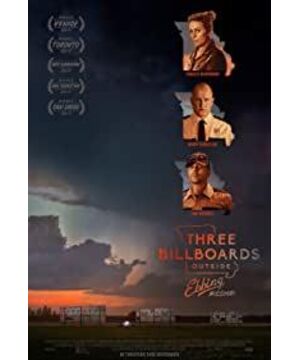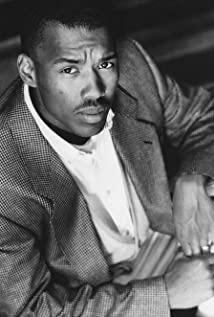"Three Billboards" can penetrate people's hearts directly from the solid script, director's style, actor's performance, expounded theme, and thought-provoking ending.
Even the film’s original soundtrack, a few simple melodies played by the guitar, and the notes from each string can directly touch your tear ducts (Nominated for the Best Soundtrack of the Oscar in 2018).
The director of the film is Martin McDonald , a Hollywood gold medalist screenwriter and director .
The well-known works "The Killer Has No Holiday" and "Seven Insane Diseases" let his black humor style develop and get everyone's call.
Martin Macdonald is good at shaping the character of each character in the story, and has a keen insight into the extreme events of the society, so as to show the versatility of the characters, and finally explore the philosophy of anger, redemption, and violence.
The plot of each scene of "Three Billboards" is handled neatly and neatly, without any sloppyness. Every plot turn is like a boring hammer, which strikes your soul through the body.
The black humor of "Three Billboards" hides bloody mourning behind each character's laughter. Although we laugh when we watch it, we feel bitterly cold after we laugh.
For such a good movie, in order not to let everyone miss any shining points, Da Cong once again masochistically pulls the film and comprehensively deconstructs the main characters of "Three Billboards".
—— Spoiler analysis begins ——
A sad Irish ballad "Last rose of summer" sang the restlessness of this town.
The lyrics sung in the film of this ballad are:
'Tis the last rose of summer, the last rose of summer
Left blooming all alone, blooming alone
All her lovely companions
Are faded and gone.
No flower of her kindred, no flower of her kindred
No rose bud is nigh, there is no other bud
To reflect back her blushes, come and act like a baby
Or give sigh for sigh. Or give sigh for sigh.
This ballad is a poem by the Irish poet Thomas Moore, so the last word in every paragraph of the lyrics rhymes.
"Alone, gone, nigh, sigh" rhymes in the first paragraph of the movie lyrics. It translates to "lonely, away, close, lamenting."
The movie opens in the misty wilderness with three billboards, and the first paragraph of "The last rose of summer" sings an epic tragedy, kicking off the Shakespearean tragedy.
Among the three dilapidated billboards, there are travel advertisements, coffee advertisements, baby products advertisements, etc. They are like memories of the happy and prosperous small town, but also hint at the desolation of today's reality and the beginning of a tragic farce.
A mother, Mildred, a few months ago, her daughter was raped and burned to death under this billboard. There has been no news of the case so far.
The mother looked at the billboard, bit her finger, and pondered for a long time. Don't underestimate this picture. This is the first time that this mother's heart is portrayed, because the kindness and anger in her heart are still swaying.
But in the end, she stepped on the accelerator and drove in the direction that made the decision-the billboard company.
She talked to the advertising boss about the three billboards, using anger and resentment to point out the police's inaction in the rape and murder of her daughter.
Many public accounts have noticed that when they were discussing the specific content of the billboard, Mildred’s action to help an insect turn over on the windowsill illustrates the tenderness deep in the heart of the angry mother.
This is a very good profile description, but Da Cong will show you a deeper level——
At first, when my mother was sitting in the car and looking at the billboard, she wore her hair, no different from the average American woman.
After that, I came to the advertising company, tied up my hair, dressed in a neutral dress, and began to transform to the hard side of the characters.
After the business was negotiated, the three billboards were painted blood red, and that was the end of the matter.
The image of Mildred on this day, based on the overalls, wears a red dress, matching the blood red of the billboard, and most importantly, she wears a headscarf and accepts TV’s Interview.
This headscarf reminds people of a movie "Deer Hunter". The character Nick in the film also wears a similar headscarf. The most famous scene is that he wears this red headscarf to play the Russian turntable. This is a scene The gamble of life.
After the three billboards were activated, Mildred also put on a headscarf, showing that she knew that she was playing a life gamble, and she was always ready for the society to fight back against her.
The appearance of this mother's image in the first few paragraphs has already implied that her social resistance has become fiercer every time.
The first head-on confrontation came from Sheriff Willoughby's visit.
They argued for reasons that Willoughby tried to explain the case to her with too little information and no matching DNA evidence.
Mildred actually suggested that men over the age of eight in the town should take blood for DNA testing. Finally, they simply said that it is best for all men to store their DNA in the database as soon as they are born. As long as there is an accident, take it out for a comparison. Kill it.
Her suggestion can be called the plot of a future science fiction blockbuster.
At this time Willoughby realized that the conversation could not go on at this point. The mother put the mutual understanding behind her head and placed a brutal accountability in front of him. What she wanted was not a statement, but an almost inexhaustible one. The truth reached.
From a deeper perspective, what Mildred did was a manifestation of guilt towards her daughter. She forced herself not to forget and to maintain her anger towards the world, and this anger had nowhere to rest because there was no truth. Transfer the anger to the police.
After that, Willoughby said that he had cancer. He thought it was a killer feature, but he never thought that Mildred knew about it and attacked Willoughby with unkind words.
Here everyone pays attention to a small detail-
After Mildred got back to Willoughby’s cancer, she involuntarily swung on the swing. It stands to reason that such a strong mother would not suddenly swing on the girl’s heart. This can only show that she is at this time. Ease of disguising yourself.
Because she also knows that she is too much to say so, but she prefers this kind of inhumanity, if it can be transformed into the motivation of the police to handle the case, she can make people all over the world hate her.
Dah Cong admired the perfect acting skills when he saw the performance of such subtle movements by the heroine at this time.
The second head-on conflict came from the uninvited priest.
The priest thought that he represented the people and came to "criminal" Mildred, implying that she removed the billboard that insulted the sheriff.
Not to be outdone, Mildred directly used religion and compared Christianity to a rogue gang, and a priest to a gang leader. As long as one person is guilty, whether it is a total accomplice.
This implies that Mildred is not only an atheist, but also that she dislikes absolute justice in religion, which leads to the film's discussion of religious sacredness.
Globally, Western religions can be said to hold up the banner of Western traditional civilization and have always stood firm.
However, many recent real cases and the revelations of many film documentaries have allowed us to discover incidents in which a small number of people with clergy status have accused of sexual assault but have not been punished by law.
This section of the film Mildred responds to the priest's words, which illuminates the existence of current problems.
Linguistic conflicts quickly turned into physical violence.
When Mildred went to see the dentist, even the dentist disliked her billboards. When the dentist showed his position, she got her finger through.
Soon she was summoned back to the police station for questioning and confronted the sheriff over the billboard again.
During the confrontation, the film used black humor to tease the issue of racial discrimination in the United States, teased the American dentist, and introduced Mildred’s ex-husband.
Just a few back and forth conversations, not only paid attention to some sensitive issues in the United States, but also laid the groundwork for the next ex-husband’s appearance. Such refined lines are wonderful.
Just before the two of them had a fight to win, Sheriff Willoughby sprayed a mouthful of blood on Mildred's face because of cancer.
At this time, both of them were trapped, and the plot turned into a 180-degree turn.
Mildred's extremely hard heart was instantly softened by the blood on her face, the kindness in her heart was awakened, and she hurried to call an ambulance.
This can be regarded as the first positive portrayal of Mildred in the film. This act alone made the audience feel uncomfortable with what she had done before.
If these conflicts are from outside, then her son's disapproval of her is that Mildred can't fight back with anger.
So she chose to remain silent, but her son's anger reminded her of the last conversation between her and her daughter.
She thought of the quarrel between her and her daughter before they died, because Mildred was unwilling to lend her daughter a car, which indirectly led to her daughter's death.
And when the mother and daughter finally scolded each other, Mildred cursed her daughter for being raped halfway.
Guilt, self-blame, regret, once again eroded this helpless mother.
When Dah Cong saw this, he actually had a conjecture. He felt that Mildred's last words to curse his daughter were not true. It was because she was too guilty and shackles herself.
Because when her daughter died, she recalled what she had done to her daughter in the past, thinking that she was still far away from a competent mother.
Therefore, she changed her fantasies to achieve the greatest degree of self-blame for herself, thus allowing herself to live in painful punishment for her entire life.
Of course, this is just a conjecture. The last quarrel between the mother and daughter in this memory can also be true. It just means that if you really said that sentence, it would be a coincidence that the script was designed too deliberately. , Instead of becoming less advanced.
The following visit by Mildred’s ex-husband let the audience understand why her character is so cynical.
The family can lift the table, choke their necks, and hold the neck with a knife in just a few words. It's so lively, seeing the 19-year-old ex-husband and girlfriend who went into the house to go to the bathroom incoherent.
Yes, such a violent family has created Mildred's character that looks at the world coldly, has a dirty mouth, and is indifferent to his children.
Because she believes that she can only save herself by standing in such a cold and violent family with this attitude.
But soon, the family quietly set up the table that was thrown off, and spoke touching words of repentance. At that moment, how weak they were.
As the film progressed, more and more portrayals of Mildred's inner fragility. After the previous conflicts, she finally went to the three billboards and planted some red flowers and plants.
This move is a symbol of remembrance. Firstly, this was the place where her daughter died tragically, and secondly, the billboard became her only spiritual sustenance.
At this time, the magical pen was that a hundred-tailed deer came quietly to Mildred's side.
The mother saw this beautiful deer and thought of her daughter, so she began to mutter to herself. Her experience told her that this is not the reincarnation of her daughter, but how much she hopes that this kind of reincarnation is true at this time.
After talking to herself, looking at the white-tailed deer going away, Mildred finally failed to resist the miss for her daughter. She cried in her arms, still chanting her daughter's name in her mouth.
At this point in the film, Mildred's character of good and evil, tenderness and violence has been fully established.
But both the audience and the characters in the film believe that when the contradiction of the story is over, a new contradiction suddenly bursts out of the originally unresolved contradiction. This new contradiction is the suicide of Sheriff Willoughby.
This is also where Dah Cong thinks this script is awesome. Before the main line contradiction of the story has been resolved, a contradictory event spontaneously arises in the main contradiction, which catches the audience and the characters in the film off guard.
As soon as the news of Sheriff Willoughby’s suicide broke out, the people in the small town turned from sympathy to Mildred to spurn on her.
Even at the school where her son went to, some people threw drinks at their car.
The stranger came to the shop where she worked and used her daughter's rape and murder case to provoke her, humiliate her, and even want to destroy her.
It can be said that Mildred caused public outrage because of the suicide of Sheriff Willoughby.
What is this irony? Isn't it like today's unclear online violence (Dah Cong suffers from it)? Is n't it like the stumbling-face when the crowds chasing a news event today?
Therefore, the violence of the "mass" needs an vent. As Willoughby's follower, Dixon used the advertising boss to vent his anger, beat the advertising boss half to death, and threw it directly from the second floor.
Because in Dixon’s innocent mind, he believed that the bottom line was that the advertising boss was "ghostly obsessed" at the beginning and let the billboards be posted.
In addition, her ex-husband was drunk and burned the billboard.
Mildred was just on the way home and saw three burning billboards. She struggled to rescue her, because this was the only spiritual connection between her and her daughter.
The burning of the billboard also burned to Mildred's heart. She finally chose to use violence to combat violence and burned a useless police station with gasoline bottles in protest.
This scene is very shocking, and it is also the hot spot of Mildred's human evil in the film, but when he saw her burning the police station, Dah Cong wanted to shed tears. What a distorted maternal love, it makes people sympathetic and helpless.
This feeling makes Dah Cong think of Cersei in "Game of Thrones". After the successive deaths of her eldest son Jolly Buddha and her daughter Messiah, in order to preserve the maternal love of the third son , she did not hesitate to cooperate with the whole world. Enemy, blow up the entire cathedral.
Of course, "Three Billboards" is not a road to revenge. Although Mildred was angry, she did not become a heinous villain. Before burning the police station , she repeatedly called to confirm that no one set fire.
But the contradictions in the plot escalated again, and Dixon was burned by a fire in the police station.
When Mildred saw Dixon escaping from the fire, he was still holding her daughter's case file.
This time, she was really helpless. The anger of vengeance made her feel at a loss. She seemed to have fallen into an abyss of vengeance and could not extricate herself, but this abyss did not lead to the truth of her daughter.
But often when events push the protagonist to the bottom of the abyss, it is the time to witness the transformation of the protagonist's character arc.
At this point in "Three Billboards", Mildred went from being accountable to the outside world, to resistance, to revenge. In the violence, she was losing herself.
And all the chaos that entangled in Mildred's heart was hit by her ex-husband during a dinner. To be precise, it was hit by a sentence seen by her ex-husband’s girlfriend. Her ex-husband said--
Anger will lead to greater anger.
This sentence can be said to be the finishing touch of the whole movie. The whole billboard incident was caused by Mildred’s anger alone, and then transferred to the anger of many people, and then the anger of many people was projected back to herself, forming a vicious Circulation, finally made Mildred a poor but unlovable person.
No wonder James, the dwarf who has always liked her, said helplessly to her during dinner—
who do you think You Are?
Billboard lady who never smiles,
Never said a good word to anyone,
I went to burn the police station at night,
All the things awakened Mildred’s inner goodness once again, and this time, she blessed her ex-husband’s feelings. Although she hadn’t put down her daughter’s case yet, Mildred began to try to put down her angry self. .
After that, Dixon tracked down the suspect. He thought that the case would finally be settled, but the realistic joke once again satirized this cruel society. That suspect was not the real culprit of this rape and murder.
At the end of the film, it ends in Mildred and goes to the direction of the suspect's house with Dixon.
In the end, they used violence to control violence and killed a person without evidence? Or do you let go of the past, open to the future, and face life again?
Dah Cong is more willing to believe the latter, not because of political correctness, but because of the film’s mother, Mildred. After experiencing so many tragedies and anger in life, she began to choose to let go of herself and this fucking world.
Pay attention to Da Cong's words, it is to let go, not to forgive.
Mildred may not forgive the world around her, but she tried to stop using anger and bury her anger. For her daughter’s love, perhaps with the passage of time, the memories will become blurred, but that’s because of missing reason.
Just like the ending song "Buckskin stallion blues" (buckskin stallion blues) sings——
I heard her cry on a summer storm
I loved her, but she did not know it
So I don't think about her anymore
…….
If I had your love forever
Sail into the light of day
This song is a good interpretation of a positive attitude. On a sunny day, the two people in the car, each with their anger and love for the world, drove toward a bright day.
A good sheriff, loved by the residents of the town, is also the accountability of the three billboards this time.
To see a character in a movie, the most important thing is to see the character's first appearance.
Willoughby's first appearance was to answer a phone call. He spoke vulgar words in front of the child, but turned around and apologized to the child.
Such a lively performance immediately reflects Willoughby's rough but gentle image.
In the film, Willoughby takes care of Dixon at work, and establishes the image of a good sheriff in the small town. In life, he is a good husband who can make his wife sexually happy, and he is also a capable A good father who makes children happy.
In this rape and murder case, he has tried his best, but still nothing.
Just when he was about to retire, he also suffered reputational accountability.
More importantly, he had cancer.
But even so, when Mildred injured the dentist, Willoughby could lock her up, but Willoughby chose to let Mildred go.
In the final stage of Willoughby's life, he may have seen it lighter than anyone else, diminishing fame and fortune, and diminishing anger and hatred.
He chose to reunite with his family on a sunny day, go fishing with his children, and have sex with his lover.
It was also that night, one day with good memories, he left the world and committed suicide in the stables.
When he died, he did not forget to leave three letters to his wife, to Mildred, and to partner Dixon.
From another perspective, these three letters are actually letters written by Willoughby himself. The meanings of these three letters are:
The first letter is about his feelings about the world (wife and children),
The second letter is about his misunderstanding of himself in the world (the billboard incident),
The third letter is his love for the world (enlightening Dixon).
Dixon is actually upright, pure, and righteous in his heart, but he also has an Oedipus plot and is an angry racist.
If the sheriff is a person of foresight, then Dixon is a person of hindsight.
He takes a lot of things too superficially and makes a lot of jokes. In the end, these black humours lost his job.
After Willoughby's death, he chose to vent his anger, and the easiest and most direct way to vent was to run to the opposite advertising company and beat up the advertising boss.
After receiving Willoughby's letter, he was "reborn from the ashes", and through his hand-to-hand combat with the suspect, he scraped off the suspect's dander and used it for DNA comparison.
Everything is going in a good direction, but the cruelty of reality is to ignite their hopes and blow them out coldly.
This kind of disappointment in the status quo, just like Dixon's final dialogue with the new sheriff, the kind of determination he returned to the police badge, without a trace of nostalgia.
In the end, Dixon and Mildred were in the car driving far away, and neither of them looked angry anymore, not angry at what each other did, not angry at the billboard incident, and not angry at this society.
Therefore, they will no longer be angry about wanting to kill the suspect.
Because there are two male characters echoing from left to right, the advertising boss doesn't have many roles, but Dah Cong still thinks it is outstanding.
The first time the advertising boss appeared, he was looking at a book called "A Good Man Is Hard to Find" . This book is actually composed of many short stories about evil and redemption.
"A Good Man is Hard to Find" tells the story of a grandmother's family traveling, and encountering a fugitive that her grandmother knew when she was young. In the end, the grandmother's family was murdered like revenge.
The human nature in "A Good Man Is Hard to Find" is not positive, but there are many discussions about anger, revenge and morals in the story. The book that the advertising boss read reflects on him, and he learned to forgive in the face of anger. .
So when he was beaten into the hospital by Dixon and found out that his new patient was a burned Dixon, he chose to forgive him.
When the director deals with the relationship between Dixon and the advertising boss, most of it is verbal and physical violence.
Therefore, in the hospital scene, the director wanted to let the audience see the uselessness and ugliness of violence through the scarred two people, and let the audience understand the violence and anger, which can actually be resolved with a glass of juice.
In addition, the dwarf James in the film also describes how difficult it is for a special group of people like him to pursue a normal life in real life.
There are also Mildred’s ex-husband, son, Willoughby’s wife, etc. Although each role has very few roles, each of their roles with the protagonists is very delicate and rich, and the performance is also very natural. In place.
It is worth mentioning that the script of "Three Billboards" was actually written seven or eight years ago, but it was not filmed until these two years, and it was released last year.
But just as the saying goes, the weather vane of this year's Oscar is the theme of women's equal rights.
There are several films that focus on women alone this year, such as "Three Billboards", "I, Queen of Flowers", "Miss Bird", "The Shape of Water", "The Washington Post", and only the role of mother , There are three.
Although each of the above works is very good and the competition is fierce, but Da Cong still likes "Three Billboards" the most.
If "Three Billboards" can't get the best picture in the end, then this movie will become another Oscar's legacy.
Pay attention to the public account of "Da Cong Watching Movies", do not pursue running volume, only grind high-quality goods
View more about Three Billboards Outside Ebbing, Missouri reviews











